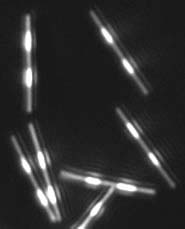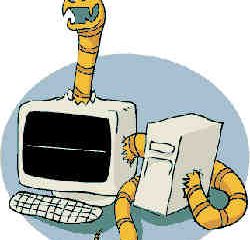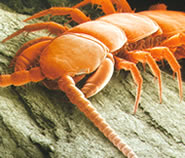
Stripes help chemists shop for molecules.
Scientists may soon be sticking bar-coded metal rods into molecules to see what they do in a crowd 1 . The rods could help to track the functions and interactions of genes, and may aid drug discovery.
At only a few thousandths of a millimetre long, the rods are small enough to fit inside a single red blood cell. Christine Keating, of Pennsylvania State University, and colleagues cast them inside cylindrical pores in a

New Analysis of Computer Worm Indicates Additional Destructive Payload Symantec Corp. (Nasdaq: SYMC), a world leader in Internet security, today announced that new analysis of W32.Nimda.A@mm reveals that the worm contains an additional destructive payload that will not only require detection, but removal. The new analysis indicates that the worm is a file infector, overwriting .exe files. W32.Nimda.A@mm is a mass-mailing worm that utilizes multiple methods to spread itself. The worm

Centipede genealogy has scientists and supercomputers foxed
Four-fifths of all known creatures are arthropods. So immense is this family that no one knows who is related to whom. To resolve the relationships between the family members, the insects, spiders, crustaceans and centipedes, two research groups have performed state-of-the-art analyses – and come up with two different answers.
The main problem is the centipedes and millipedes, collectively called the myriapods. One

Silicon still has a lot to offer the microelectronics industry
The end is not nigh for silicon chips. They have “enormous remaining potential”, predicts a new analysis of the limits of integrated circuit technology 1 .
By around 2011, chips could be holding thousands of times more transistors than the billions they house today, calculate James Meindl and colleagues at Georgia Institute of Technology in Atlanta. Trillion-transistor chips are known as ’terascal
Embargo until September, 6 2001
E-BioSci is a new, next generation scientific information service initiated by EMBO to meet the future needs of researchers in the life sciences and funded by the European Commission with 2,4 million Euro over three years. The service – aimed at establishing Europe’s leadership in one of the most important and fast moving scientific fields of our day – will offer scientists and other researchers new forms of navigation through the dramatically increasing floo
Delta Debugging automates the scientific method of debugging. The basic idea of the scientific method is to establish a hypothesis on why something does not work. You test this hypothesis, and you refine or reject it depending on the test outcome. When debugging, people are doing this all the time. Manually. Delta Debugging automates this process. Read more…